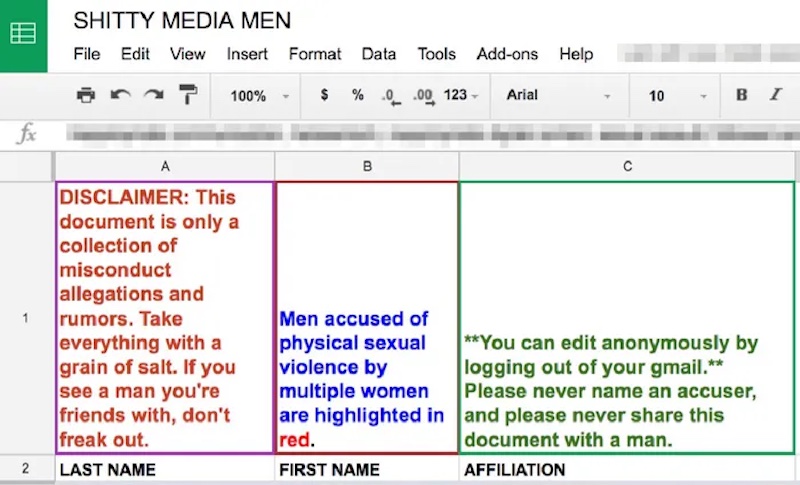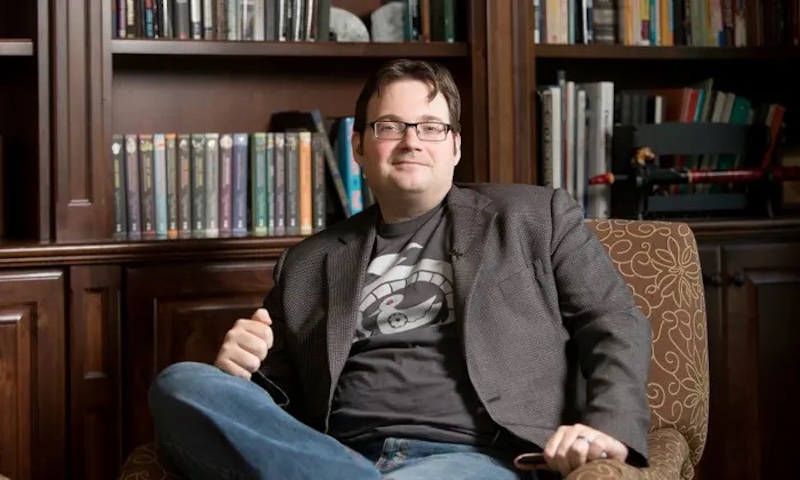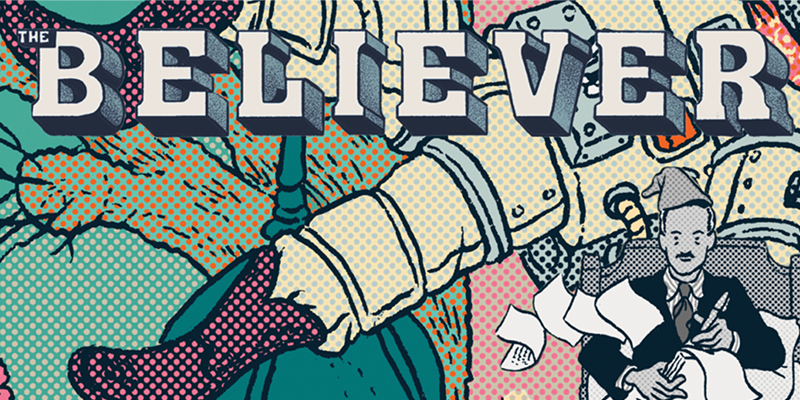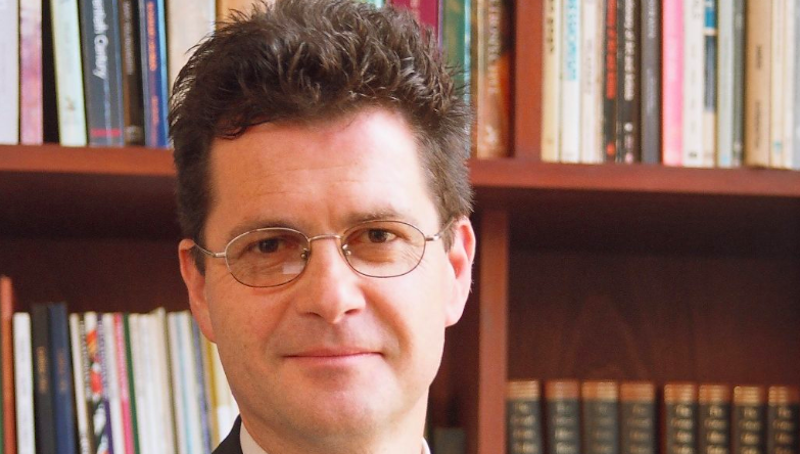
It was the best of times, it was the worst of times… All right, it was mostly still the worst of times. Looks like we’re stuck in the dark timeline, guys. Sorry about that. Still, things happened this year, and some of them happened to books, or book people, or book Twitter (RIP?).
For the sake of posterity, and probably because we’re masochists, here’s the second installment of the 50 biggest literary stories of the year, so you can remember the good, the bad, and all the literary non-hotties we met along the way.

30.
Surprising exactly no one, Skyhorse announced they would publish Blake Bailey’s memoir about cancel culture.
While we do not, under any circumstances, have to hand it to Skyhorse, publisher of Sandy Hook deniers, anti-vaxxers, January 6th conspiracy theorists, and Woody Allen—their brand is extremely consistent. To wit: they will be publishing another book by disgraced biographer Blake Bailey (they picked up Bailey’s Roth biography after W. W. Norton dropped it in the wake of extensive reports that Bailey had groomed and pursued sexual relationships with his former students, and sexually assaulted publishing executive Valentina Rice).
if Blake Bailey can get a new book deal with S&S to write this gross “memoir,” I’m sorry, there is no such thing as cancel culture. pic.twitter.com/HXI7U9dVUa
— Jacqui Shine is 80087355 (@DearSplenda) July 26, 2022
The book, Repellent, is set to be a thorough accounting of Bailey’s behavior in which he takes complete accountability for the… no no, just kidding—it is, of course, a memoir about cancel culture.
According to Skyhorse’s publicity copy, it was not the many accusations of sexual assault, but rather “ominous forces” that led to Bailey’s downfall:
Because of revelations in Bailey’s biography, many were calling for Philip Roth and his work to be “canceled,” while others seemed to think Bailey had been overly sympathetic and even “complicitous” with his subject’s worst failings. Soon rumors exploded on the internet about Bailey’s own private life, and within days he himself was roundly canceled.
Again, people’s opinions about Philip Roth had nothing to do with Norton pulling the book, but… go off, Skyhorse publicity team. Speaking of which, who is even working at Skyhorse? (A few suggestions from the Lit Hub staff: seven Babadooks and Kid Rock, three tiny and ill-tempered horses in a trench coat, and Vincent Adultman but evil.)
As ever, a special shoutout to Skyhorse’s distributor, Simon & Schuster! –Jessie Gaynor, Lit Hub senior editor

29.
It was the Year of Art Spiegelman.
2022 has been marked by an alarming uptick in book bans across America. Though I’d hesitate to point to any kind of silver lining at a time when books, libraries, and the children who rely on them are under attack, the bans did succeed in bringing attention to some excellent (banned) books, and their authors. Most gloriously, Art Spiegelman, whose Pulitzer Prize-winning graphic memoir Maus was banned from a school district in Tennessee—allegedly because of swear words and one instance of illustrated nudity and not because of antisemitism (okay!).
When news of the ban came out, Spiegelman appeared on CNN—while vaping—to weigh in. He called the ban “daffily myopic, saying, “I’ve moved past total bafflement to trying to be tolerant of people who may possibly not be Nazis? Maybe? Because having read the transcript of the school board meeting, the problem is sort of bigger and stupider than that.” In the months since the ban, Maus topped Amazon’s bestseller list, and Spiegelman was honored with Medal for Distinguished Contribution to American Letters at the National Book Awards (where he delivered an excellent speech).
The takeaway here, of course, is that Maus has always been an essential work of literature, and that Art Spiegelman has always been cool as hell. In a year like 2022, though, we have to take the wins where we can find them. –JG
28.
Amazon closed its ebooks loophole.
In a surprising turn of events, Amazon did the right thing for once! In this case, the right thing was closing a loophole revealed by a TikTok about “reading hacks.” The hack: reading an entire ebook and then returning it, per a policy that allows readers to return ebooks within seven days of purchase, regardless of the amount read.
The (extremely) obvious problem with the hack is that it penalizes the authors of those books and not Amazon, who will not be penalized by anything short of government regulation (lol). In light of this, the Author’s Guild got involved, and reported today that Amazon had agreed to restrict automatic returns to ebooks where no more than 10 percent of the book has been read. (In order to return an ebook after reading more than 10 percent, customers will have to send in a customer service request—likely a higher barrier to entry for this low-grade scam than most people will willingly vault.)
I’d like to take this opportunity to remind everyone that the Libby app—which allows you to check out ebooks from your local library and read them on your phone, tablet, or e-reader—is good for authors, your bank account, and not supporting Jeff Bezos. For more reading hacks like these, follow me on TikTok! (Just kidding, I’d sooner die.) –JG
27.
Ted Cruz became an inadvertent friend of good books and indie presses.
In unsurprising—but nevertheless extremely depressing—news, during March’s senate confirmation hearings for Ketanji Brown Jackson, the first Black woman nominated to the U.S. Supreme Court, Ted Cruz spent his time haranguing Jackson about (what else?) Critical Race Theory.
Cruz’s extremely flimsy pretext for introducing the favorite buzzwords of racists/Republicans everywhere into the hearings was that Georgetown Day School, on whose board of trustees Jackson sits, included books like Ibram X. Kendi’s Antiracist Baby and Alex Vitale’s The End of Policing on its recommended reading lists. In addition to asking Jackson if she thought babies were racist, Cruz brandished Vitale’s book while making his signature “self-pitying sociopath” face (which, lest we forget, is scientifically proven to repulse people).
In a delightful turn of events, after Cruz’s truly pathetic display, The End of Policing became the number one bestseller in Government Social Policy on Amazon.
Thanks to Ted Cruz, The End of Policing is now the #1 Best Seller in Gov. Social Policy. @VersoBooks pic.twitter.com/EoAX4FJmZs
— Alex Vitale (@avitale) March 23, 2022
I suppose we have to reluctantly give it up for Ted “Why Am I Persecuted?” Cruz. –JG
26.
Most of lit journal Hobart’s editors resigned over a tedious, “anti-woke” interview.
Most of the editors at well-established literary journal Hobart resigned in October over an interview published at the site. The interview—with writer Alex Perez—was conducted by Hobart editor Elizabeth Ellen and is very long. With encouragement from Ellen, Perez rehashes numerous timeworn clichés about the artistic cowardice of the literary establishment—its elitism, its careerism, its overwhelming whiteness, its simultaneous disgust with and fetishizing of the working class—and sounds like just another caffeinated undergrad reheating yesterday’s manifesto.
If these perennial banalities (which, like all clichés, have some truth to them) were the sum of the conversation, nobody would be talking about it. But Perez and Ellen wrap it all up in Trump-era vocabularies of grievance, bitterness, “anti-wokeness,” self-aggrandizement and—crucial to the mix—some deeply hurtful racism and misogyny (plus some of their very own tokenizing of the working class!). They clearly sought outrage, and they got it. As the Hobart editors* write in their letter:
The content that started all this was regressive, harmful, and also just boring writing. The misogyny and white supremacy were treated with empathetic engagement, and that sucked beyond measure. All this led to attention being taken from the work we are proud to have published, much of it by the very writers Perez denigrated in his interview.
As for how Ellen was able to make a unilateral editorial decision like this, that clearly wouldn’t have been approved by most of the masthead:
All staff editors at Hobart have the same publication privileges on the back end of the website. This allowed for flexible work schedules and reduced hierarchy, but it also relied on everyone acting responsibly. We all had the technical power to publish whatever we wanted with impunity; the success of Hobart as a group project required all editors to act with good faith and with the knowledge that our actions would reflect on everyone else.
Additionally, Hobart operated on a rotating editorial schedule with each section editor taking over reviewing and publishing submissions four times a year. This was meant to alleviate burnout for the volunteer staff, but it also created a structural weakness in that it sometimes meant section editors were not aware of other people’s editorial decisions on months when we were not on deck.
This editorial independence can be a strength, but in practice it created a system in which group accountability was not prioritized. We have monthly check-ins with fellow editors, but that wasn’t enough. This delayed our response to negative actions in a way that compounded harm. For that, we deeply apologize.
Ellen has remained defiant about the whole thing and will, I guess, be taking over Hobart—or at least its Twitter account?—for the near future.
When women piss ppl off, it’s another level of anger/rage directed at them than at men (there’s your sexism). I learned that in 2014. I’m stronger now. Words no longer hurt me. I hope every woman feels this strong at some point in her life. This unafraid. This liberated. Truly.
— Hobart (back in January, 2023!) (@hobartpulp) October 13, 2022
To read some thoughtful, non-misogynistic, non-racist takes on the problem the literary establishment has with class, you could always click on the following, which aren’t a billion words long.
beCAusE nO onE WiLL tAlk ABoUt iT
“If they want to be published, literary writers can’t talk about money.”
“The forgotten history of American working-class literature.”
“A writing school for the working class.”
“Searching for myself in working-class art.”
“Unearthing the stories of the working class.”
“From wage labor to writer.”
“What I didn’t know about life, marriage, and working on the line.”
And here’s noted literary saint of the white working class, Jack Kerouac, fetishizing… the white working class.
This insecure, hypermasculine “outsider” pose is nothing fucking new. –Jonny Diamond, Lit Hub editor
25.
Stephen Elliott and the Shitty Media Men List will probably go to trial.
In 2017, a writer and editor named Moira Donegan created a Google spreadsheet. She titled it “Shitty Media Men” and sent it to a small group of industry colleagues, who in turn, sent it to their contacts, too. Maybe you remember seeing it. By the end of the night, there were almost 100 names of editors, writers, and publishers who had allegedly harassed or assaulted women. Contributors were anonymous. Accusations ran the gamut, including creepy DMs, inappropriate behavior at work events, and rape. The rules of the communal document, written at the top were: “Please never name an accuser, and please never share this document with a man.” As you probably know, the list was leaked. A woman named Doree Shafrir wrote about it on Buzzfeed.
Among the men named was Stephen Elliott, a writer and founding editor of The Rumpus. In 2018, a year after the list was created, he filed a defamation lawsuit against Moira Donegan, claiming that she had obliterated his reputation in the literary world. He’s trying to get at least $1.5 million in damages. He continues to deny the allegations against him. His standard defense? That his sexual preferences have been well-documented (?), and that he is, essentially, “too submissive” (??) to have raped anyone. Since this all started, so many other stories have come out since, about his pushy and heinous behavior towards women.
Moira Donegan’s lawyer, Roberta Kaplan, has been unable to get the case dismissed, and it will likely go to trial. Stand by, and believe women. –Katie Yee, Lit Hub associate editor
24.
Netflix adapted Jane Austen’s Persuasion and everyone haaaaaated it.
It started in June, when the trailer dropped. It was an adaptation of Persuasion, Austen’s final novel, starring Dakota Johnson and slated to appear on Netflix on July 15. Vogue called it a “stylish, subversive new take on Jane Austen” and EW described it as “cheekily modern.” The only problem is . . . all that wink and whimsy is assuredly not the vibe of Persuasion. As the Jane Austen fans of the internet were quick to point out.
Things didn’t get any better once the movie was actually released. “The initial backlash centered on the fact that of all the Austen novels ripe for the Fleabag treatment, Persuasion perhaps makes the least sense,” wrote Emmeline Clein. “Austen’s final completed novel, published after her death, Persuasion follows its single 28-year-old protagonist as she faces her sorrow and loneliness head on, while exhibiting forbearance, grace, and dignity in front of family, friends, acquaintances, and even her ex-lover.
But the Fleabag-ification of Anne Elliot is more nuanced and insidious than a simple mistranslation of Anne’s personality in her journey from page to screen. When Fleabag breaks the fourth wall in her eponymous television show, she often does so in moments of acute interior distress, addressing the camera in a deadpan tone as she says “I hate myself” or “This is fine” in a situation that is, very deeply, not fine. Fleabag smirks and scoffs at the pain she endures as a woman in the contemporary world engaging in heterosexual romance.
In doing so, Fleabag practices what I’ve elsewhere called “dissociation feminism,” a coping mechanism that allows her to push away her pain—not because she’s transcending it, but because doing so renders her more palatable to her audience. Her snide asides implicate herself in her suffering while absolving the society that molded her and continues to restrict her movements. She gives her audience permission to laugh at her pain, implying that those of us with similar scars should be grinning through it, too.
–Emily Temple, Lit Hub managing editor

23.
A woman who wrote an essay about how to murder her husband was sentenced to life for murdering her husband.
Huh. Imagine that. A few years after Nancy Crampton Brophy—a self-published romance novelist—wrote an essay called “How to Murder Your Husband,” her husband was found shot to death in his classroom at the Oregon Culinary Institute in Portland. While that essay might have been a little bit of a red flag to investigators, the trial judge has deemed it inadmissible as evidence on the grounds it might prove prejudicial (you think?).
Nonetheless, the case seemed solid, as there were no signs of struggle or theft in the murder, and Brophy’s minivan was seen arriving at and leaving the scene around the time of the shooting. And the alleged motive? As old as time. Greed: Brophy would have stood to collect a $1.4 million life insurance policy. Which reminds me of one of the first rules of spouse-murdering: do not write an essay about how to murder your spouse.
The trial began in April, and by June, Brophy had been convicted and sentenced to life in prison for the crime. –JD
22.
Fantasy and sci-fi author Brandon Sanderson raised $41 million on Kickstarter to self-publish four novels.
Apparently, Brandon Sanderson’s goal was to raise a measly one million dollars, but sometimes you shoot for the stars and land on the moon?
On March 1st, Sanderson revealed on YouTube that he’d written five “secret” novels during the pandemic and was launching a Kickstarter campaign to self-publish four of them. And boy, were his fans stoked: within 24 hours, he set a Kickstarter record when he hit $15.4 million. By the end of the 30-day campaign, 185,341 backers had pledged $41,754,153.
If you’re new to Sanderson, he introduces his work on the Kickstarter page: “The one thing you should know is that many of my books take place in a universe called the Cosmere. … Think of the Cosmere like the Marvel Cinematic Universe, except every story (instead of starring a different superhero) is taking place on a different fantasy planet with its own ecology and magic.” (He also finished Robert Jordan’s high fantasy series The Wheel of Time after Jordan’s death.)
His website includes progress bars on each of the books, which seems like a terrifyingly useful form of creative accountability, though something tells me Sanderson doesn’t need it. (Speaking of accountability, has anyone heard from George R. R. Martin lately?) –Eliza Smith, Lit Hub special projects editor
21.
The Believer came back from the dead (after a brief stint as a website for sex stuff).
In May, shortly after the surprising news that The Black Mountain Institute at The University of Nevada, Las Vegas, had sold the magazine The Believer to a marketing company called Paradise Media, The Believer found itself back with its former parent company, McSweeney’s.
The Sex Toy Collective(!), a website owned by Paradise which had announced itself on Twitter last week as the new owner of The Believer, has tweeted the news of the magazine’s sale:
We’re happy to announce we decided to sell The Believer to McSweeney’s for a significant discount. There’s a press release coming out about it soon. Please donate to them here to support The Believer. https://t.co/bTZwXsntTw.
– the sex toy collective— The Believer (@believermag) May 16, 2022
In October, The Believer announced that The Black Mountain Institute had chosen to shutter the magazine, making their February/March 2022 issue their final one. Last week, after an article advertising hookup sites appeared on The Believer, the Sex Toy Collective announced that they planned to feature articles and advertisements on the website that might generate revenue. The Believer’s former editor Kristen Radtke, who had left the magazine in July before the shuttering of the magazine, took to Twitter to explain the details that she knew.
Alright. Here’s what happened. I left The Believer in July, and a few months later its parent institution, the Black Mountain Institute based at UNLV, announced it was shuttering the magazine. It went up for sale. https://t.co/wB5TDrOrgD
— Kristen Radtke (@KristenRadtke) May 10, 2022
Radtke mentioned that after the Black Mountain Institute, which had owned The Believer since 2017, announced its plans to shut down the magazine, McSweeney’s, which founded the magazine in 2003, had attempted to buy it back, to no avail, losing out to a bid by Paradise Media. According to The New York Times, Paradise Media had purchased the site for $225,000. McSweeney’s had begun crowdfunding an amount to “bring The Believer back home.”
Following a large public outcry, Paradise Media agreed to sell The Believer back to McSweeney’s. Explained Paradise Media’s Chief Executive Ian Moe, “They can do a much better job than us.” –Olivian Rutigliano, CrimeReads associate editor
20.
“NFT brain” led to at least one very poor book-buying decision.
Hope may have clouded observation in one of the biggest mistakes made this year: an anonymous NFT group purchased a rare copy of Alejandro Jodorowsky’s concept art book for his unproduced adaptation of Dune at auction in January. The group, which calls themselves Spice DAO (decentralized autonomous organization), bought the copy for over one hundred times its low estimate: its low estimate was 25,000 euro, and Spice DAO bought the book for 2,660,000 euro. Why would they do this? Because they thought buying a copy of the book would mean they also owned the copyright.
This embarrassing mistake was made public by Spice DAO themselves, when they tweeted their mission: to “make the book public (to the extent permitted by law),” to “produce an original animated limited series inspired by the book and sell it to a streaming service,” and to “support derivative copies from the community.” They also planned to sell NFTs of parts of the book, then burn the physical copy.
A few problems here. What Spice DAO bought was a copy of Jodorowsky’s Dune book. Just as when I buy a copy of Luster online, I can’t make my own television series based on it, Spice DAO doesn’t have the rights to produce content based on the book they bought. They could have gotten confused because the book is rare—only ten copies are thought to exist—but even rare book collectors are purchasing the objects themselves, which have value due to their rarity and particular attributes.
Plus, Spice DAO said they wanted to make the book public—but Twitter quickly pointed out that it already is, available to view online for free.
My diagnosis: this is a case of NFT brain leaking into other spaces. Because NFTs are so new and so customizable, there’s been some confusion about whether purchasing a given NFT means you own the copyright to the purchased object, or whether you simply own that digital object. (Usually it’s the latter.) Spice DAO worked that confusion back into the physical realm and made a three-million-dollar mistake. Talk about a mind-killer. –Walker Caplan, Lit Hub contributor
19.
Heather Havrilesky “hated” her husband.
The saying that “all publicity is good publicity” was really pushed to the limit on this one. Here’s the gist: Heather Havrilesky—essayist, humorist, and cultural critic—published a comedic memoir in February titled Foreverland: On the Divine Tedium of Marriage, and some media outlets had an absolute heyday with a couple of out-of-context quotes (likening her husband, Bill, to “a heap of laundry: smelly, inert, useless, almost sentient but not quite” proved to be a popular one).
For some outlets, it was certainly clickbait: the New York Post’s headline was “Wife calls marriage ‘insane,’ hates her husband: ‘Snoring heap of meat.’” (Most headlines referred to Havrilesky as “Wife,” or “Woman, 51,” instead of, you know, author.) Some reviewers seemed to get their feelings hurt. Most of the hosts of The View were VERY concerned about the “name-calling” and what Bill’s colleagues must think of his manhood. Pearls were clutched!
I haven’t read Foreverland yet (I plan to!), so I reserve my own judgment, but I do appreciate Havrilesky’s project to normalize talking about the entirety of marriage, and to counter the “impossibly bloated expectations of how a ‘good’ wife or mother should look and sound.” And I defend her right to consensually call her husband a heap of laundry. –ES
18.
Spotify got into the audiobook game.
In September, the streaming giant Spotify debuted its audiobook hub with more than 300,000 titles, a move that was first announced in 2020. Now, before you run off to your app, expecting the same subscription-based model Spotify uses for music and podcasts (i.e. $4–15/month gets you unlimited access to a seemingly infinite catalog), Spotify didn’t go that far: they’re still operating on a pay-per-book model, and they’re staying mum about their revenue sharing model with publishers.
Getting into audiobooks was probably a good bet: the New York Times reports that audiobook revenues totaled $1.67 billion in 2021, up 25 percent from 2020 (the tenth straight year of double-digit growth, according to the Audio Publishers Association). Spotify’s biggest competitor is (surprise, surprise) Amazon, aka Audible, so cheers to a little healthy market competition, I guess. No word yet on how authors feel about sharing a platform with Joe Rogan, who used his likely $200 million contract with Spotify to spread Covid-19 misinformation, conspiracy theories, and anti-trans language on his podcast—the platform’s most popular of 2022.
Anyway, we love audiobooks, so keep listening to them however you get them. And just so you know, you CAN still get them on CD, which is my main mode of tuning in, because I am (my car is) that old. –ES
17.
Britney Spears landed a record-breaking book deal.
Just months after successfully fighting off the court-ordered 14-year conservatorship (put in place by her nefarious father James “Jamie” Spears), Britney Spears scored another big win.
In February, news broke that the 40-year-old pop superstar (whose debut single “…Baby One More Time” was released almost a quarter of a century ago now) had inked a book deal with Simon & Schuster—worth somewhere in the region of $15 million—for an untitled tell-all memoir.
The deal was described to Page Six as “one of the biggest of all time, behind the Obamas,” whose $60 million multi-book deal with Penguin Random House in 2017 remains the high-water mark.
Things have been pretty toxic for poor Britney for a while now. Far from being lucky, she was often the last to know about her own finances, and her family situation was a bit of a circus. It sometimes seemed like everyone wanted a piece of her. The whole thing was enough to drive anyone crazy, but here’s hoping that the beloved singer feels buoyed by these recent victories, and comes back stronger. Crossroads. –Dan Sheehan, Book Marks editor
16.
The Proud Boys stormed story time.
America’s sad little homegrown fascist brigade, the Proud Boys (like the Brownshirts, but with less no sex!), took their victimhood/insecurity-driven agenda to new depths of idiocy this year. In June, a group of around ten men interrupted Drag Queen Story Time at the San Lorenzo Library in Alameda County, California; according to the sheriff’s office:
The men were described as extremely aggressive with a threatening violent demeanor causing people to fear for their safety. Deputies responded to the scene and were able to de-escalate the situation.
Most of that “demeanor” was aimed at storyteller and performer Panda Dulce—aka Kyle Chu—who was reading to a group of pre-K kids in celebration of Pride Month. Said Chu, of the experience:
I’ve always received death threats, hate mail for doing drag queen story hour. This time it felt very close to violence. […] It was like a cacophony of voices just yelling over one another, taunting me, calling me a groomer, a pedophile, a tranny, and an “it.” […] There’s no agenda here, except for being able to accurately reflect the diversity of our world.
Though it feels a bit like shouting into the wind, I can’t say enough how simultaneously pathetic and dangerous these fascist assholes really are. It is impossible to see how civility and/or debate is going to get us clear of the white nationalist threat to the American democratic experiment, particularly during a week in which we see just how far one party is willing to go in courting the worst impulses of its racist, homophobic base.
And lest this incident be dismissed as a few rotten apples taking things too far, it seems likely the Proud Boys were made aware of the event via the social media account Libs of TikTok, a wildly popular clearinghouse for far right talking points.
As for the consequences of their brave attack on a pre-K story time, the Alameda County sheriff’s office says the men could face charges of hate crimes along with “annoying and harassing children.”
Of course this was not—was never going to be—an isolated incident. It seems likely that the San Diego attack was instigated by the far right social media account, Libs of Tik Tok, which posted to its 1.3 million followers about the event. Sadly, awfully, more Proud Boys (which might as well be a catch-all for all self-proclaimed white nationalist “patriots”) have taken it upon themselves to attack children’s events across the country.
For nearly 30 years, since the rise of Newt Gingrich, civility liberals have wondered aloud if “this was the last gasp of old, white, bigoted America,” repeating over and over again that the best response to bad speech was more good speech, that sunshine was the best disinfectant. And then the neocons took over. And then the Tea Party burbled up from America’s id. And then MAGA, and its incel foot soldiers, the Proud Boys.
This is how fascism works: put pressure on civil institutions to see which ones will hold; attack marginal communities to see how much the majority will allow… Repeat. The stark truth, now, is that help isn’t coming from elsewhere. Not the federal government, and certainly not the Supreme Court. Now is the time when we must defend our neighbors, our community, from nationally grown, locally distributed hate.
I’m not talking about isolating and arming up, I’m talking about getting involved, doing the messy, sometimes uncomfortable work of participating in your community. Volunteering, donating, showing up.
Because they’re going to keep coming, and they’re not going to stop at queer story time. –JD
15.
Australian novelist John Hughes plagiarized from obscure novel The Great Gatsby.
So we beat on, writers against our deadlines, born back ceaselessly into the pages of extremely well-known novels. Yes, I will take any excuse to mangle the closing line of The Great Gatsby, but at least I credit my source material. Not so Australian novelist John Hughes, who first had to apologize for plagiarizing from Nobel laureate Svetlana Alexievich’s book The Unwomanly Face of War “without realizing it” in his novel, The Dogs.
Apparently Alexievich wasn’t the only writer who (heavily) influenced Hughes; a few days later The Guardian reported that Hughes also lifted whole passages, very lightly altered, from the very obscure novels The Great Gatsby, Anna Karenina, and All Quiet on the Western Front. The plagiarism, it was blatant.
Still, Hughes decided to rebut the claims, with a bizarre defense in The Guardian, which begins with the irrelevant fact that Gabriel García Márquez opened One Hundred Years of Solitude with a character remembering something even though Juan Rulfo, a novelist García Márquez really liked, opened his 1955 novel Pedro Paramo with a character remembering. And no one wrote an article in The Guardian calling him a plagiarist!
Hughes provides the opening lines of those two novels, for context:
One Hundred Years of Solitude:
“Many years later, as he faced the firing squad, Colonel Aureliano Buendía was to remember that distant afternoon when his father took him to discover ice.”
Pedro Paramo:
“Years later Father Renteria would remember the night his hard bed had kept him awake, and driven him outside.”
Check… mate?
Hughes goes on to say “My whole writing life has been a dialogue with the books I love (a kind of writing collage).” (Dialogue and collage are two very different things, but okay!) He also gives the ol’ “Mr. Police, I gave you all the clues” defense: “In The Remnants, my narrator announces at the start that ‘This is a book made out of books’ and goes on to list all the books that have gone into its making.”
In conclusion: Hughes is not a plagiarist, any more than Jean Rhys or a Pierre Menard, the fictional Borges character who tried to rewrite Don Quixote word for word, or all musicians ever. And even if he is a plagiarist, he told you he was doing it! –JG
14.
The Russian invasion of Ukraine devastated that country’s literary community—and revealed its resilience.
Russia’s invasion of Ukraine on February 24th was an enormous news story several orders of magnitude beyond the scope of a website devoted to books. But insofar as we’ve always believed that writers bear the burden of witnessing and recording history as it happens, we tried to do all we could to provide a platform for the Ukrainian literary community, at home and abroad.
Putin’s war on Ukraine is of a scale that impacts every aspect of life, and that includes publishing; though with the same resilience shown by an entire nation, Ukrainian publishers have refused to give up. So too, have Ukraine’s poets (in the great tradition of Taras Shevchenko) risen to the moment, not with patriotic bromides, but with courage and unflinching honesty. Here is translator Amelia Glaser on Ukrainian poet Marianna Kiyanovska, whose work we ran in August (along with many other Ukrainian poets).
Throughout the Spring of 2022, Kiyanovska has posted poems to her facebook page about those regions most affected by Russia’s full-scale invasion. Here too Kiyanovska highlights the collectivity of a “multilevel I.” One poem assumes a child’s voice to describe a missile strike in lines that are all the more brutal for their childish rhyme scheme and rhythm:
it’s our very last moment of silence
we’ve already had four
Three times since this morning: sirens
we all ran out the door
we knew Tanya’d run ahead
but the bomb buried everyone
Tanya, missing a leg, lies dead
still in kindergarten
–JD
13.
We all collectively sifted through Joan Didion’s things, and thought about what that meant together.
he allure of Joan Didion has always encompassed more than just her writing. From her iconic packing list to her Céline campaign, Didion’s stuff was not incidental to her literary legend. So it’s no surprise that in addition to all the astronomical bids ($27,000 for the Céline shades! $11,000 for a set of blank notebooks!), Didion’s estate auction, “An American Icon,” which took place this November, also launched a thousand essays.
Most of the writing around the auction’s frenzy reflected on the magical thinking (sorry) that convinces us that some microscopic fragments of Didion’s talent might cling to her possessions, and be transferred, in turn, to their new owners. Of course, if you can afford $27,000 sunglasses, you can probably buy all the fringe benefits of talent, anyway, so a more cynical part of me just thinks this is a symptom of people having too much money and too little imagination.
Whatever lessons you choose to take from the auction’s wild financial and editorial success, at least we all won the knowledge that Joan Didion owned an apron printed with the words “Maybe Broccoli Doesn’t Like You Either.” And that is a gift that’s worth its weight in Limoges fish plates. –JG
12.
Annie Ernaux won the Nobel Prize.
In October, the French author Annie Ernaux was awarded the Nobel Prize in Literature “for the courage and clinical acuity with which she uncovers the roots, estrangements and collective restraints of personal memory.” Ernaux is the author of some twenty works of fiction and memoir, winner of the Prix Renaudot for A Man’s Place and the Marguerite Yourcenar Prize for her body of work, and recently the winner of the International Strega Prize and the French-American Translation Prize and shortlisted for the Man Booker International Prize for The Years.
And for once, the oddsmakers and predictors did okay! You can read an excerpt from Ernaux’s Getting Lost here. And definitely read Lauren Elkin on encountering Ernaux’s urban landscapes and scattered selves here. –Emily Firetog, Lit Hub deputy editor
11.
The literary manuscript thief was arrested.
For years, someone had been stealing unpublished book manuscripts. According to the New York Times, “The thefts and attempted thefts occurred primarily over email, by a fraudster impersonating publishing professionals and targeting authors, editors, agents and literary scouts who might have drafts of novels and other books.” The scammer had targeted work by high-profile writers like Margaret Atwood and Ian McEwan, but also “short story collections and works by little-known debut writers… even though they would have no obvious value on the black market.” (Ouch, NYT).
Reeves Wiedeman wrote an entertaining-if-you’re-in-the-book-industry seven thousand word article for New York Magazine trying to unmask the thief (although, “two of this magazine’s editors sat me down and said that I couldn’t spend all year investigating a crime with no real victims.”) Then, in early 2022, the U.S. Attorney’s Office for the Southern District of New York announced that it had arrested Filippo Bernardini, a 29-year old Italian rights coordinator for Simon & Schuster UK. Bernardini is accused of “impersonating, defrauding, and attempting to defraud, hundreds of individuals” over five or more years, obtaining hundreds of unpublished manuscripts in the process; he pleaded not guilty to wire fraud and aggravated identity theft. What could his possible motivation be?
Alex Shepard has a deep dive in The New Republic trying to answer why, including a close read of Bernardini’s mediocre novel, but Michael Driscoll, the assistant director-in-charge of the FBI’s New York office, provided the closing lines for the somewhat boring crime novel that will be written about this: “Mr. Bernardini was allegedly trying to steal other people’s literary ideas for himself, but in the end he wasn’t creative enough to get away with it.” –EF


















